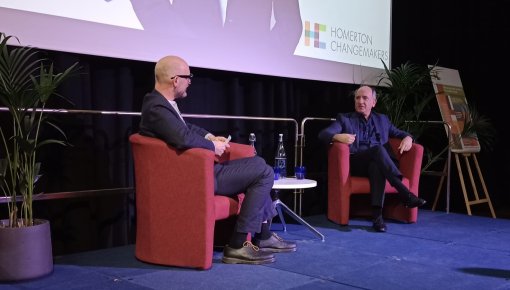The Diminishing Returns Of Armando Iannucci's Satire

Table of Contents
The Over-Reliance on Familiar Tropes
Iannucci's signature style, initially revolutionary, has arguably become predictable and formulaic. His early success relied on a potent blend of chaotic office environments, outrageously flawed characters, and a relentless barrage of verbal abuse. However, this once-fresh approach now feels somewhat tired, leading to a sense of déjà vu for longtime fans.
- Repetitive use of vulgarity and shouting matches: While profanity served a purpose in highlighting the absurdity of political discourse in his earlier works, its overuse now feels less impactful and more like a crutch.
- Overemphasis on chaotic office environments: The frantic energy of The Thick of It and Veep became a defining characteristic, but the constant chaos in later projects feels less inventive and more like a lazy reliance on a well-worn formula.
- Predictable character arcs and plotlines: Characters often follow predictable trajectories, lacking the nuanced development that made the figures in his earlier work so memorable.
- Lack of nuanced character development beyond broad stereotypes: The characters, while often hilarious, frequently rely on broad, easily identifiable stereotypes, hindering their depth and relatability.
This reliance on familiar tropes is particularly evident in Avenue 5, where the chaotic, dysfunctional workplace dynamic, while familiar, lacks the same sharp satirical bite as his previous work.
The Shifting Political Landscape
The political landscape has dramatically shifted since Iannucci's initial rise to prominence. The increasing absurdity of real-world politics, coupled with the rise of new forms of political communication, poses significant challenges for political satirists.
- The increasing absurdity of real-world politics surpassing satire: The sheer lunacy of contemporary political events often eclipses even the most outlandish fictional portrayals, making satire feel less relevant or impactful.
- The changing media landscape and the rise of social media as primary sources of political commentary: The immediacy and constant stream of information provided by social media have changed how we consume and engage with political commentary, potentially rendering traditional satirical formats less effective.
- The difficulty of maintaining satirical edge in a constantly evolving political context: Keeping pace with rapidly changing political events and maintaining a satirical edge requires constant adaptation and innovation, a challenge that some argue Iannucci's work has not fully met.
Other satirists have attempted to navigate this changing landscape by incorporating new media formats, focusing on different aspects of political discourse, or embracing more subtle and nuanced forms of satire.
A Loss of Sharpness and Nuance
While Iannucci's early work was characterized by its incisive wit and insightful social commentary, critics argue that his later projects have exhibited a decline in subtlety, relying more heavily on shock value for comedic effect.
- Lack of exploration of complex political issues: His later works seem to shy away from deeper explorations of complex political issues, opting instead for surface-level commentary.
- Simplification of characters and motivations: Characters are often reduced to one-dimensional caricatures, lacking the depth and complexity that made his earlier creations so compelling.
- Decreased focus on insightful social commentary: The sharp social commentary that permeated his earlier works appears diminished in his more recent projects.
The Case of Avenue 5
Avenue 5, a space tourism comedy, serves as a prime example of this perceived decline. While showcasing the familiar Iannucci hallmarks of chaos and verbal sparring, it failed to resonate with critics and audiences in the same way as his previous triumphs. The show's critical reception was mixed, highlighting a perceived lack of originality and a reliance on tired tropes. Its failure to deliver the same level of incisive satire as Veep or In the Loop further strengthens the argument of diminishing returns.
The Diminishing Returns of Armando Iannucci's Satire: A Call for Evolution
In summary, the perceived diminishing returns of Armando Iannucci's satire can be attributed to an over-reliance on familiar tropes, the shifting political landscape, and a perceived loss of sharpness and nuance. While his contributions to political satire are undeniable, the article suggests a need for a renewed approach. Can Iannucci reinvent his satirical style to effectively address the ever-changing political and media landscape? Will his future work reclaim the sharp edge of his earlier creations, or will the trend of diminishing returns continue? Only time will tell if he can recapture the brilliance of his earlier works, but the need for evolution in his approach is clear.

Featured Posts
-
 Republican Deal Or Bust Trumps High Stakes Gamble
May 26, 2025
Republican Deal Or Bust Trumps High Stakes Gamble
May 26, 2025 -
 Moto Gp Inggris 2025 Jadwal Lengkap Siaran Langsung Trans7 And Spotv Dan Klasemen
May 26, 2025
Moto Gp Inggris 2025 Jadwal Lengkap Siaran Langsung Trans7 And Spotv Dan Klasemen
May 26, 2025 -
 Nepotism In Hollywood Actresss Mothers Emmy Win Fuels Discussion Following Butler Photo
May 26, 2025
Nepotism In Hollywood Actresss Mothers Emmy Win Fuels Discussion Following Butler Photo
May 26, 2025 -
 The Nvidia Rtx 5060 Launch Lessons Learned From The Review Debacle
May 26, 2025
The Nvidia Rtx 5060 Launch Lessons Learned From The Review Debacle
May 26, 2025 -
 Naomi Kempbell Goryachaya Fotosessiya Dlya Modnogo Glyantsa
May 26, 2025
Naomi Kempbell Goryachaya Fotosessiya Dlya Modnogo Glyantsa
May 26, 2025
Latest Posts
-
 Amorims Transfer Wish List Seven Players For Man United
May 28, 2025
Amorims Transfer Wish List Seven Players For Man United
May 28, 2025 -
 Rayan Cherki Transfer News Manchester United Among Contenders
May 28, 2025
Rayan Cherki Transfer News Manchester United Among Contenders
May 28, 2025 -
 Manchester Uniteds Pursuit Of Rayan Cherki A Realistic Transfer Target
May 28, 2025
Manchester Uniteds Pursuit Of Rayan Cherki A Realistic Transfer Target
May 28, 2025 -
 Tottenham In Race For Ligue 1 Star Confirmed Departure And Transfer Timeline
May 28, 2025
Tottenham In Race For Ligue 1 Star Confirmed Departure And Transfer Timeline
May 28, 2025 -
 Tottenham Target Ligue 1 Winger Transfer Update And Key Dates
May 28, 2025
Tottenham Target Ligue 1 Winger Transfer Update And Key Dates
May 28, 2025
